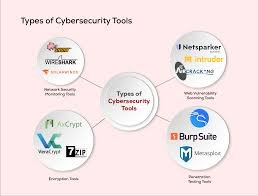Top Cybersecurity Tools and Gadgets Every Online Business Needs
As the digital landscape continues to evolve, online businesses face increasing cybersecurity threats. Hackers are becoming more sophisticated, and data breaches are more common than ever. To protect sensitive information, maintain customer trust, and avoid costly breaches, it’s critical to invest in the right cybersecurity tools and gadgets. In this article, we’ll explore the top cybersecurity tools and gadgets every online business needs in 2025 to stay secure.
1. Firewalls
Firewalls are essential for safeguarding online businesses from unauthorized access and malicious traffic. They act as a barrier between your internal network and external threats, filtering incoming and outgoing traffic based on predefined security rules. Businesses should implement both hardware and software firewalls for maximum protection.
Why it’s crucial:
Firewalls block unwanted traffic, reducing the risk of malware and unauthorized access to sensitive business systems. In today’s digital age, no business should operate without a firewall.
2. Antivirus and Anti-Malware Software
Antivirus software detects, removes, and protects against harmful software like viruses, worms, and trojans. Anti-malware tools go a step further by identifying and blocking malicious software specifically designed to steal sensitive data. These tools continuously scan your systems for potential threats and can prevent infections before they cause damage.
Why it’s crucial:
Online businesses often fall victim to malware attacks that steal customer data or disrupt operations. By installing reliable antivirus and anti-malware software, businesses can reduce the risk of data breaches and system downtime.
3. Multi-Factor Authentication (MFA) Tools
Multi-Factor Authentication (MFA) provides an added layer of security by requiring users to verify their identity with multiple factors, such as a password and a fingerprint or a one-time code sent to a mobile device. MFA tools like Google Authenticator, Duo Security, or Authy are essential for securing online accounts and user logins.
Why it’s crucial:
MFA makes it significantly harder for hackers to gain access to sensitive business accounts, even if they manage to steal a password. This simple yet effective tool greatly enhances security.
4. VPNs (Virtual Private Networks)
A VPN creates a secure connection between the user’s device and the internet, encrypting all data transmitted across the network. Businesses should use VPNs to protect sensitive data, especially when employees access company systems remotely or on public Wi-Fi networks.
Why it’s crucial:
Using a VPN ensures that sensitive business data, such as financial information or customer details, remains private even when accessing the internet from unsecured networks. A VPN is especially vital for businesses with remote teams.
5. Password Management Tools
Password management tools like LastPass, 1Password, and Dashlane help businesses store and generate strong passwords securely. These tools ensure that each password is unique, reducing the chances of password-related breaches. They also help employees manage login credentials without compromising security.
Why it’s crucial:
Weak and reused passwords are a common entry point for cybercriminals. Using a password manager eliminates the risk of using weak or repeated passwords, improving the overall security of business accounts.
6. Intrusion Detection and Prevention Systems (IDPS)
Intrusion Detection and Prevention Systems (IDPS) are designed to detect and prevent any unauthorized access to a network. These systems monitor network traffic for unusual activity or patterns that may indicate a potential attack, such as SQL injection, DDoS attacks, or brute force login attempts.
Why it’s crucial:
IDPS tools offer real-time monitoring, which helps businesses react quickly to potential cyber threats, minimizing the impact of attacks before they escalate.
7. Encryption Tools
Encryption is one of the most powerful ways to protect data. Encryption tools like BitLocker, VeraCrypt, or Symantec Data Loss Prevention can encrypt sensitive business files and communications, ensuring that even if data is intercepted, it remains unreadable without the decryption key.
Why it’s crucial:
Encrypting sensitive information, including customer data and financial transactions, is vital for compliance with regulations like GDPR and CCPA. It ensures that even if a cybercriminal gains access to your data, they cannot use it.
8. Cloud Security Solutions
Cloud security solutions like Cloudflare, AWS Shield, or Microsoft Azure Security provide enhanced protection for businesses storing data in the cloud. These tools prevent data breaches, DDoS attacks, and unauthorized access to cloud-stored information, ensuring that cloud environments are secure.
Why it’s crucial:
As more businesses move to the cloud, ensuring the security of cloud data becomes more critical. Cloud security solutions help businesses protect valuable data while maintaining accessibility for authorized users.
9. Security Information and Event Management (SIEM) Systems
SIEM systems, such as Splunk or IBM QRadar, aggregate and analyze security data from various sources within the business network. They provide real-time insights into potential security events, such as unauthorized logins or unusual system behavior, allowing for faster response times to cyber threats.
Why it’s crucial:
SIEM systems enable businesses to detect and respond to threats in real-time by offering a centralized view of all security-related data. This proactive approach minimizes the risk of undetected attacks.
10. Backup Solutions
Regularly backing up business data is essential for disaster recovery. Backup solutions like Acronis, Backblaze, and Carbonite automatically back up critical business data to secure locations, ensuring that in case of a breach, data loss, or cyberattack, you can quickly restore your operations.
Why it’s crucial:
Data loss due to cyberattacks can be devastating for online businesses. By having a reliable backup system in place, businesses can recover quickly without losing important files or customer data.
11. DDoS Protection Tools
Distributed Denial of Service (DDoS) attacks can overwhelm business websites and make them temporarily or permanently inaccessible. DDoS protection tools such as Cloudflare, Akamai Kona Site Defender, or Imperva mitigate these attacks by dispersing malicious traffic, preventing the website from going down.
Why it’s crucial:
DDoS attacks can cause severe disruptions, affecting both website performance and customer trust. With DDoS protection tools, businesses can prevent downtime and ensure their websites remain accessible at all times.
12. Security Awareness Training Tools
Human error remains one of the biggest cybersecurity threats. Security awareness training tools like KnowBe4 or CybSafe educate employees on how to identify phishing attempts, social engineering tactics, and other common cyber threats. These tools help create a cybersecurity-conscious workforce.
Why it’s crucial:
Regular training ensures that employees recognize potential threats and know how to respond appropriately. This proactive approach reduces the likelihood of successful attacks that exploit human error.
Conclusion
In today’s digital environment, cybersecurity should be a top priority for every online business. By implementing the right cybersecurity tools and gadgets, businesses can protect their sensitive data, maintain customer trust, and prevent costly breaches. From firewalls and VPNs to password management tools and encryption, each of these solutions plays a vital role in creating a secure online environment. In 2025, staying ahead of cyber threats means embracing the latest security technology to safeguard your business from evolving risks.

